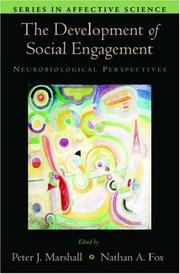| Listing 1 - 8 of 8 |
Sort by
|
Book
ISBN: 089391231X 9780893912314 Year: 1985 Publisher: Norwood (N.J.): Ablex,
Abstract | Keywords | Export | Availability | Bookmark
 Loading...
Loading...Choose an application
- Reference Manager
- EndNote
- RefWorks (Direct export to RefWorks)
Social perception in children --- Infant psychology --- Infant psychology. --- Social perception in children.

ISBN: 0898592690 9780898592696 Year: 1984 Publisher: Hillsdale (N.J.): Lawrence Erlbaum,
Abstract | Keywords | Export | Availability | Bookmark
 Loading...
Loading...Choose an application
- Reference Manager
- EndNote
- RefWorks (Direct export to RefWorks)
Child development --- Emotions --- Facial asymmetry --- Facial expression --- Neurophysiology --- Psychophysiology --- Developmental psychobiology --- Emotions in infants --- Infants --- Psychobiologie du développement --- Emotions chez le nourrisson --- Nourrissons --- Psychology --- Development --- Développement --- Developmental psychobiology. --- Emotions in infants. --- Child development. --- Emotions. --- Facial expression. --- Neurophysiology. --- Psychophysiology. --- Development. --- Psychology. --- Psychobiologie du développement --- Développement --- Facial Expression. --- Child Development. --- Facial Asymmetry --- psychology. --- Infants - Development

ISBN: 0195168712 9780195168716 Year: 2006 Publisher: Oxford Oxford University Press
Abstract | Keywords | Export | Availability | Bookmark
 Loading...
Loading...Choose an application
- Reference Manager
- EndNote
- RefWorks (Direct export to RefWorks)
Neurobiology. --- Sociobiology. --- Emotions. --- Social psychology. --- Social psychiatry. --- Autism. --- Interpersonal Relations. --- Biological Evolution --- Genetics, Behavioral --- Neurobiology, Cellular --- Neurobiology, Molecular --- Cellular Neurobiology --- Molecular Neurobiology --- Gender Issues --- Husband-Wife Communication --- Partner Communication --- Relations, Gender --- Gender Relations --- Social Interaction --- Communication, Husband-Wife --- Communication, Partner --- Communications, Husband-Wife --- Communications, Partner --- Gender Issue --- Gender Relation --- Husband Wife Communication --- Husband-Wife Communications --- Interaction, Social --- Interactions, Social --- Interpersonal Relation --- Issue, Gender --- Issues, Gender --- Partner Communications --- Relation, Gender --- Relation, Interpersonal --- Relations, Interpersonal --- Social Interactions --- Friends --- Emotional Intelligence --- Autistic disorder --- Autism spectrum disorders --- Hyperlexia --- Psychiatry, Social --- Clinical sociology --- Mental health --- Psychiatry --- Social medicine --- Social psychology --- Mass psychology --- Psychology, Social --- Human ecology --- Psychology --- Social groups --- Sociology --- Feelings --- Human emotions --- Passions --- Affect (Psychology) --- Affective neuroscience --- Apathy --- Pathognomy --- Biologism --- Human biology --- Human evolution --- Psychology, Comparative --- Social evolution --- Neurosciences --- Social aspects --- Autism --- Emotions --- Neurobiology --- Social psychiatry --- Sociobiology --- Interpersonal Relations --- Social Relationships --- Relationship, Social --- Relationships, Social --- Social Relationship --- Social Behavior
Book
ISBN: 9780805811728 Year: 1993 Publisher: Hillsdale (N.J.) Erlbaum
Abstract | Keywords | Export | Availability | Bookmark
 Loading...
Loading...Choose an application
- Reference Manager
- EndNote
- RefWorks (Direct export to RefWorks)
Digital
ISBN: 9783319980775 Year: 2018 Publisher: Cham Springer International Publishing
Abstract | Keywords | Export | Availability | Bookmark
 Loading...
Loading...Choose an application
- Reference Manager
- EndNote
- RefWorks (Direct export to RefWorks)
This book examines three decades of research on behavioral inhibition (BI), addressing its underlying biological, psychological, and social markers of development and functioning. It offers a theory-to-practice overview of behavioral inhibition and explores its cognitive component as well as its relationship to shyness, anxiety, and social withdrawal. The volume traces the emergence of BI during infancy through its occurrences across childhood. In addition, the book details the biological basis of BI and explores ways in which it is amenable to environmental modeling. Its chapters explore the neural systems underlying developmental milestones, address lingering questions (e.g., limitations of studying BI in laboratory settings and debatable benefits of self-regulatory processes), and provide recommendations for future research. Key areas of coverage include: Animal models of behavioral inhibition. Social functioning and peer relationships in BI. Attention mechanisms in behavioral inhibition. BI and associative learning of fear. Behavioral inhibition and prevention of internalizing distress in early childhood. The relations between BI, cognitive control, and anxiety. Behavioral Inhibition is a must-have resource for researchers, clinicians, scientist-practitioners, and graduate students across such fields as developmental psychology, psychiatry, social work, cognitive and affective developmental neuroscience, child and school psychology, educational psychology, and pediatrics.
Developmental psychology --- Age group sociology --- Social welfare methods --- Psychiatry --- kinderpsychiatrie --- sociaal werk --- adolescenten --- ontwikkelingspsychologie
Book
ISBN: 0674726995 0674726073 9780674726079 9780674724709 0674724704 9780674726994 Year: 2014 Publisher: Cambridge, Massachusetts
Abstract | Keywords | Export | Availability | Bookmark
 Loading...
Loading...Choose an application
- Reference Manager
- EndNote
- RefWorks (Direct export to RefWorks)
Romania's Abandoned Children reveals the heartbreaking toll paid by children deprived of responsive care, stimulation, and human interaction. Compared with children in foster care, the institutionalized children in this rigorous twelve‐year study showed severe impairment in IQ and brain development, along with social and emotional disorders.
Abandoned children --- Deprivation (Psychology) --- Loss (Psychology) --- Psychology --- Children, Abandoned --- Exposed children --- Homeless children --- Psychology. --- Deinstitutionalization
Book
Year: 1994
Abstract | Keywords | Export | Availability | Bookmark
 Loading...
Loading...Choose an application
- Reference Manager
- EndNote
- RefWorks (Direct export to RefWorks)
Book

Year: 2022 Publisher: Cambridge, Mass. National Bureau of Economic Research
Abstract | Keywords | Export | Availability | Bookmark
 Loading...
Loading...Choose an application
- Reference Manager
- EndNote
- RefWorks (Direct export to RefWorks)
A key policy question in evaluating social programs to address childhood poverty is how families receiving unconditional financial support would spend those funds. Economists have limited empirical evidence on this topic in the U.S. We provide causal estimates of financial and time investments in infants among families living in poverty from a large-scale, multi-site randomized controlled study of monthly unconditional cash transfers starting at the time of a child's birth. We find that the cash transfers increased spending on child-specific goods and mothers' early-learning activities with their infants. The marginal propensity to consume child-focused items from the cash transfer exceeded that from other income, consistent with the behavioral cues in the cash transfer design. We find no statistically detectable offsets in household earnings nor statistically detectable impacts in other pre-registered outcomes related to general household expenditures, maternal labor supply, infants' time in childcare, or mothers' subjective well-being.
| Listing 1 - 8 of 8 |
Sort by
|

 Search
Search Feedback
Feedback About UniCat
About UniCat  Help
Help News
News